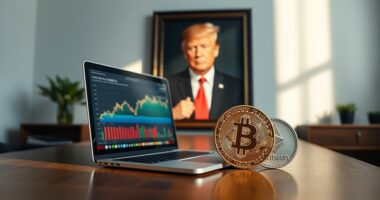As you navigate the complexities of today's financial landscape, Bitcoin stands out as a potential strategic asset. Its limited supply and decentralized framework offer a unique hedge against inflation and currency fluctuations, similar to gold. With growing institutional interest and shifting regulatory attitudes, Bitcoin's role in global finance is evolving. Yet, can it truly replace traditional safe havens, or are there inherent challenges that could undermine its status?

As economic uncertainties rise, many are turning to Bitcoin as a potential strategic asset. You might wonder why Bitcoin is gaining traction in this arena. The answer lies in its definition as a strategic reserve—a stockpile of essential resources designed to counter economic disruptions like inflation and market volatility. By diversifying reserves with Bitcoin, governments aim to hedge against these uncertainties, much like they do with precious metals such as gold.
Bitcoin's scarcity and decentralized nature make it an attractive alternative to traditional assets. Unlike fiat currencies, which can be printed without limit, Bitcoin has a capped supply of 21 million coins. This inherent scarcity fuels its potential as a store of value, especially during times of economic instability. As the Bitcoin Act of 2024 suggests, as you contemplate the role of strategic reserves in financial stability, consider how Bitcoin could contribute to maintaining economic security in a turbulent world. Additionally, the importance of effective digital asset management cannot be overlooked when considering the long-term viability of such reserves.
However, for Bitcoin to solidify its position as a strategic asset, regulatory acceptance is essential. You'll notice that the landscape is evolving, with increasing clarity around regulations driving institutional investment. Major players in finance are starting to recognize Bitcoin's potential, and proposals like the Bitcoin Act of 2024 indicate that governments are beginning to consider it for their reserves.
Yet, widespread adoption hinges on Bitcoin's integration into mainstream financial systems, coupled with advancements in its scalability, security, and usability.
The interplay of macroeconomic factors is also crucial. Inflation concerns and geopolitical tensions are creating a growing demand for Bitcoin as a hedge against currency devaluation. As you look to the future, consider how global monetary policy shifts could further support Bitcoin's role. If it achieves global strategic asset status, predictions suggest its price could soar to $500,000, marking a significant milestone in its history.
While the prospect of a Bitcoin strategic reserve is intriguing, challenges remain. Questions about management and funding persist, particularly regarding which authority would oversee such a reserve. Incorporating Bitcoin into central bank assets could diversify holdings, similar to gold and foreign currencies.
The U.S. government already holds substantial amounts of Bitcoin from seizures, raising the possibility of it becoming part of a strategic reserve.









